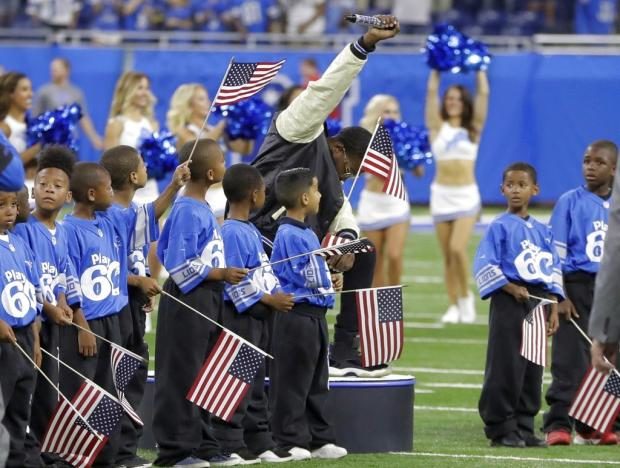
In this photo, taken Sept. 24, 2017, national anthem singer Rico Lavelle bends to his knee, bows his head and raises his fist after singing the anthem before the first half of an NFL football game between the Detroit Lions and the Atlanta Falcons in Detroit. The sight of football players kneeling during the national anthem is the continuation of a tradition nearly as old the song itself. University of Michigan musicology professor Mark Clague says “The Star-Spangled Banner” has been a channel for protest since at least the 1840s. (Photo by CARLOS OSORIO / AP)
DETROIT — When football players kneel during the national anthem, Mark Clague sees the continuation of a tradition as old as the song itself.
The University of Michigan musicology professor and expert on “The Star-Spangled Banner” said the song has been a channel for protest since at least 1844, three decades after Francis Scott Key wrote the lyrics during a pivotal battle against the British in the War of 1812.
Since that time, the lyrics have occasionally been rewritten or expanded to push for the end of slavery, for women’s rights and to call attention to other social issues that shaped a growing nation.
“The song becomes a vehicle for commenting on what it means be American,” he said.
Former San Francisco 49ers quarterback Colin Kaepernick began taking a knee during the anthem in the 2016 preseason to make a statement about social inequality and police treatment of blacks in the United States.
After President Donald Trump suggested that NFL owners should fire athletes who protest during the song, more than 200 players knelt or took other action during last weekend’s games. Some fans booed in response.
The players’ actions were “very much in keeping with past protests,” Clague said.
In the days of slavery, the words were changed to begin with “Oh Say, Do You Hear” as an abolition song.
During the civil rights movement, the anthem was sung by protesters alongside “Lift Ev’ry Voice and Sing,” the black national anthem.
Other versions were tailored to advocate for women’s suffrage, Prohibition and labor rights.
The durable yet mutable nature of the song is among its more intriguing aspects. The slower, statelier version performed today started life as a more upbeat victory song, Clague notes, and the tune synonymous with American patriotism came a few decades earlier from a musician’s club in England. The tune had been married to many other lyrics even before Key’s.
No official version exists. A 1931 law simply states that the composition “known as The Star-Spangled Banner is designated the national anthem of the United States of America.”
Clague sees the song as a national symbol, no less than the Constitution or the flag. And it’s “a living document” that can change – “the same way the Constitution can change by amendment or the flag can change by adding a star.”
“It’s the role of these symbols to help us live in in the present to deal with the challenges of our time,” he said. “It’s a misuse of the anthem to treat it as inviolate. It was always political. It is always changing. Patriotic symbols can’t function if they can’t respond the current social moment.”
Rick Robinson has a “great love” for the anthem, calling it “one of the last bits of common culture.”
Yet the classical bassist, who was only the second black musician in the Detroit Symphony Orchestra when he joined the century-old institution in 1989, also supports the players’ “soft protest” as the song plays.
It’s possible, Robinson reasons, to hold both ideas in his heart.
“Whenever I play it in the DSO or any other orchestra, I tear up sometimes, and I sing along when I hear it with full voice,” said Robinson, who played with the Detroit orchestra for 22 years. “I know [protest] is difficult for some, but it’s a necessary exercise of free speech.”